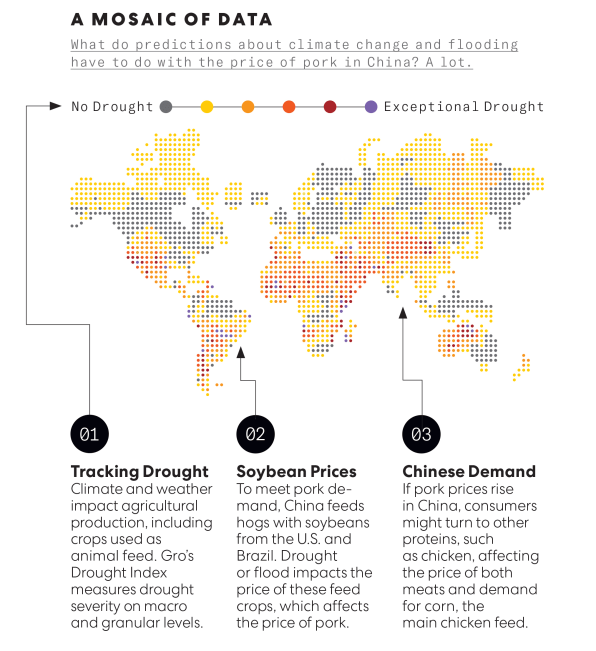[ad_1]
“Food shortage and climate change are already a problem,” says Sara Menker, and they’re “about to get worse.” As the founder and CEO of Gro Intelligence, which combines agricultural and climate data with AI and machine learning to create models that predict the future of global food security, Menker understands, on a granular level, the scope of the problem. And she’s giving others the tools to solve it. Her 8-year-old company helps clients—government agencies, humanitarian organizations, banks like BNP Paribas, and conglomerates like Unilever and Yum Brands, “see around the corner and plan accordingly.”
In May, Menker testified before the United Nations Security Council about the impact of such unprecedented factors as global conflict on food security, noting that 400 million people had lost reliable access to affordable, nutritious food in the first five months of 2022, exacerbated by the Russian invasion of Ukraine. Menker, who grew up in Ethiopia at a time when the country experienced food shortages, attended college in the U.S. and weathered the 2008 financial crisis as a commodities trader at Morgan Stanley. She has managed to build a business on her ability to withstand the worst and plan for it. This is how she predicts the future and persuades companies and governments to take action.
Identify the problem you want to solve
Growing up in Addis Ababa in the ’80s during a period of widespread famine, Menker learned how to be ready for possible shortages at an early age. “I always joke that the reason I had so much toilet paper when COVID lockdowns happened was because we used to live on rationed toilet paper,” she says. Forever affected by such scarcity, Menker had long been interested in tackling food access and supply chain issues, but wasn’t sure how. While working at Morgan Stanley in the 2000s, she saw a way. “As a trader, I saw the power of data transforming the energy market, and I realized that the solution [to food insecurity] would be around data,” she says. Today, Gro Intelligence combines more than 650 trillion data points, including agricultural and economic stats and satellite imagery, with AI to create models that predict everything from the impact of natural and human-caused disasters on food supply to how weather events affect the price of goods. Her insights now help paying customers like grocery chains and insurance companies, as well as academics and nonprofits focused on food security and climate (which can get free access to Gro’s premium-level research), anticipate supply chain issues and shortages.

Find the pattern in the data
Gro Intelligence begins with the big picture, figuring out how macro trends can affect people on an intimate level. One of Menker’s models, for example, looks at how weather patterns affect avocado production in Mexico, and considers how that will impact prices at local supermarkets. Menker tries to keep a top-level perspective on her professional life as well. “One of the weird benefits of having been an options and volatility trader in a very volatile market is that I routinely had days where I made or lost a lot of money,” she says. “I couldn’t be defined by those days or those moments. I had to be defined by the choices I made in the moment and whether I believed those choices were right.” She maintains a similar mindset as CEO of Gro, keeping her eye on her larger mission to alleviate food insecurity even as she advises companies like Yum Brands on how to help their bottom line. In 2020, when Ethiopia’s crop production was being hampered by a locust infestation, Gro provided pro bono services to the country’s government. Insights included how to strategically deploy pesticides to protect the country in the immediate term, but also on how to increase food reserves in anticipation of a longer-term rise in food prices across the globe.
Tell a story that spurs action
Menker and Gro Intelligence didn’t predict the war in Ukraine, but once it started, the company could foresee how it would affect the global agricultural market. By combining economic and climate insights with data on Ukrainian crops, Gro has been able to project the war’s global ripple effects on agriculture—for example, the salaries of crop farmers in places as far away as India. But none of these insights matter if Menker can’t make her clients act on them. That’s why she sees her company as a translator. “We work with 50,000 data sets, and we have over 2 million models in the system today. I tell clients to think, ‘what questions do I want to ask?’ rather than ‘what information do I need?’ And then we translate data that can answer their questions.” Interpreting data often means telling her clients things they don’t want to hear—and encouraging them to act on her insights. “A lot of my work, when I talk to governments or businesses, is not just telling them but showing them that events that seem impossible are actually probable and they need to do something about it.”
[ad_2]
Source link

